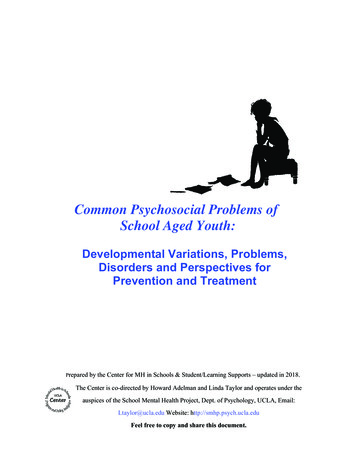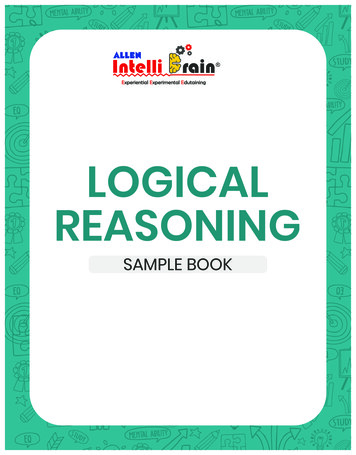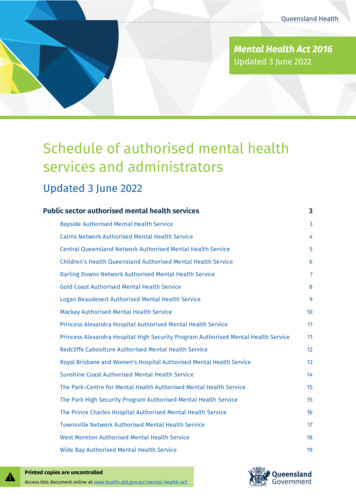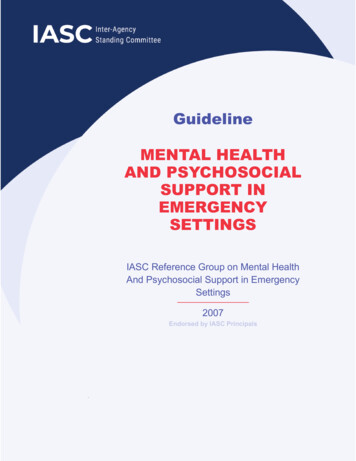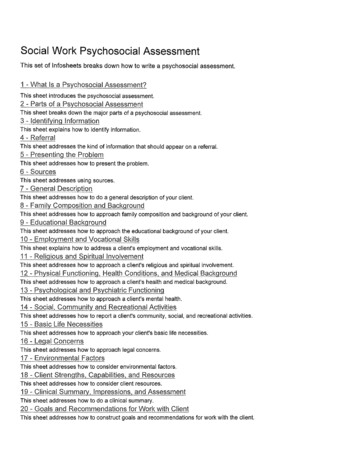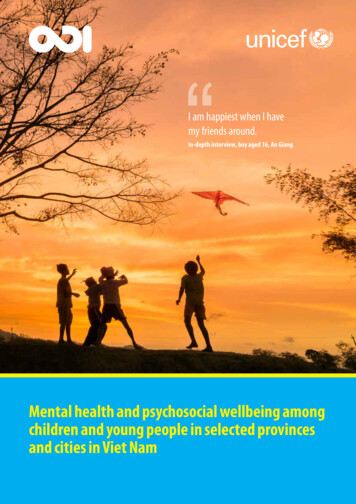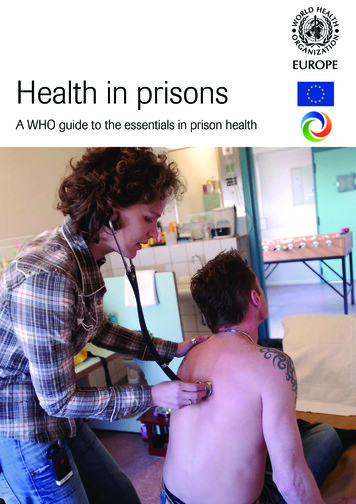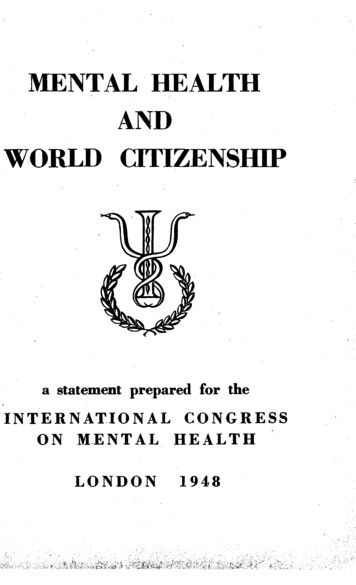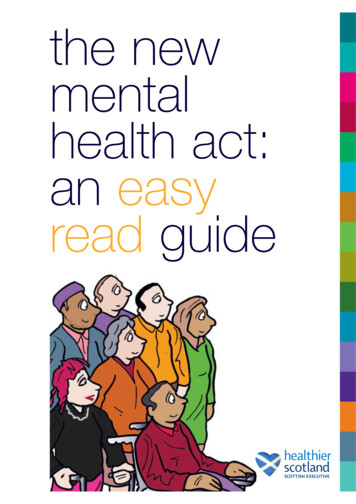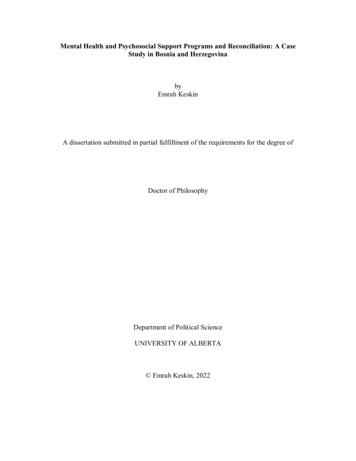
Transcription
Mental Health and Psychosocial Support Programs and Reconciliation: A CaseStudy in Bosnia and HerzegovinabyEmrah KeskinA dissertation submitted in partial fulfillment of the requirements for the degree ofDoctor of PhilosophyDepartment of Political ScienceUNIVERSITY OF ALBERTA Emrah Keskin, 2022
iiAbstractSince the mid-1990s, Mental Health and Psychosocial Support (MHPSS) programs havebecome a common means of peacebuilding following civil war, alongside re-structuring politicalinstitutions, transitional justice initiatives and refugee return. Psychology research suggests thatMHPSS programs are beneficial to individuals who have been exposed to civil war, reducingtheir trauma symptoms and transforming their attitudes towards reconciliation initiatives.Building on these findings, I investigate whether MHPSS programs’ work with individualparticipants leads to a larger resonance at the social and political level, especially in terms ofreconciliation. To understand the socio-political impact of such psychological work, I haveconducted a case study of Bosnia and Herzegovina, interviewing project managers,administrators, and counselors who administer MHPSS programs across the country. My findingssuggest that MHPSS programs help participants overcome the anger, fear, and mistrust borne outof the traumatic war experiences. However, my research also shows that negative emotions arestill prevalent among Bosnians who have traumatic experiences of war. Moreover, nationalistparties exploit these negative emotions, undermining the work of MHPSS programs andthwarting social and national reconciliation efforts. Despite more than 25 years since the signingof the Dayton Peace Accords, there has been little progress towards reconciliation at the nationallevel as ethnic polarization continues to dominate national politics. Based on four months offieldwork, 21 semi-structured interviews and desk research, I argue that MHPSS holds thepotential to transform Bosnian society and instill reconciliation at the individual, social, andnational level. However, the current socio-political structures, in which the major political partiesperpetuate ethnic division and impede individual and societal healing, counter the MHPSS effortsand hamper their ability to help advance the process of reconciliation.
iii1 PrefaceThis dissertation is an original work by Emrah Keskin. The research project, of whichthis dissertation is a part, received research ethics approval from the University of AlbertaResearch Ethics Board, Project Name “Mental Health and Psychosocial SupportPrograms and Reconciliation After Civil War: A Case Study in Bosnia andHerzegovina”, Study ID: Pro00060451, May 10th, 2016.
ivDedicated to the loving memory ofDicle Koğacıoğlu (1972-2009)andEmir Gönel (1984-2012)Your ideals have stayed with us and will live on.
vAcknowledgementsThis dissertation would not have been possible without: the unwavering love and support of my dad, Miktat Keskin, and my brother, EmreKeskin; the guidance and encouragement of my supervisor, Dr. Siobhan Byrne; the care and love of my wife, the love of my life, Chenoa Sly; the and the joy that was brought to my life by my son, Aleks Keskin.I would like to thank:My committee members Dr. Greg Anderson, Dr. Lori Thorlakson, and Prof.Duncan Saunders for their ideas and advice;Prof. Roger Epp for his continued mentorship throughout my doctoral studies;The great community of scholars at the Department of Political Science whom Ihave had the honor of working with, including Dr. Mojtaba Mahdavi, Dr. Malinda Smith,Dr. Patrick von Maravić, Dr. Julian Castro-Rea, Dr. Yasmeen Abu-Laban, and Dr. IanUrquhart;My colleagues in the graduate program, including, Michael Burton, Chad Cowie,Justin Leifso, Owuraku Kusi-Ampofo, Mariam Georgis, Leigh Spanner, KristjanaLopston, Mia Tulli, Kathi Kapfinger, Geoff Salomons, Nisha Nath and many others, forthe supportive community they have helped to form;My professors at the University of South Florida (USF), where this journeybegan, including Dr. Bernd Reiter, Dr. Scott Solomon, Prof. Mark Amen and Dr. StevenRoach; and my USF colleagues Brandon Huson and Rahi Dayerizadeh;Dr. Srdja Pavlović for helping me with my questions about Yugoslav history;Sabiha Kadri and Jelena Buljan for providing translation services; Nedžad Alićand Oliver Rogić for providing accommodations during my field research;Anja Maksić for offering her friendship and guidance during my stay in Sarajevo;My interviewees, who I unfortunately cannot name, for their kindness and theeagerness with which they have shared their experience;And the mothers of Srebrenica, for their generous spirit.This research was generously funded by:The State of Kuwait, the University of Alberta Department of Political Science,the Faculty of Graduate Studies and Research (FGSR), and the University of AlbertaInternational (UAI).
viTable of ContentsAbstract. ii1Preface. iiiAcknowledgements .vTable of Contents. viLIST OF TABLES, FIGURES AND PHOTOS . ixList of Tables . ixList of Figures . ixList of Photos . ixLIST OF ABBREVIATIONS . xHealth and Psychological Terminology: . xBosnia and Herzegovina: . xOthers: . xBOSNIAN/CROATIAN/SERBIAN PRONOUNCIATION GUIDE . xii12INTRODUCTION . 11.1Research Question, Hypothesis, and the Case . 51.2Organization of Chapters . 8LITERATURE REVIEW. 122.1Contributions to the Literature .122.1.1 Beyond the Institutional Focus. 122.1.2 Other Contributions . 172.2Mental Health and Reconciliation .182.2.1 The Literature on Reconciliation as it Relates to MHPSS Programs . 182.2.2 Previous Research on Mental Health Issues and Reconciliation. 212.3Theories of Social Mobilization Prior to Civil War .332.3.1 Social Mobilization in BiH: Theory and Practice . 352.3.2 A Social Psychology Model on Social Mobilization . 372.3.3 Socio-Psychological Infrastructure of Conflict . 392.3.4 The question of social de-mobilization: Accommodation or Paradigm Shift?. 402.3.5 Operationalizing Social Reconciliation . 442.4Relevant Scholarly Debates .452.4.1 What Constitutes a “Psychosocial Intervention”? . 452.4.2 Criticisms: Do MHPSS Programs Impose Western Norms? . 492.4.3 The Contentious Debate on PTSD . 512.53Conclusions .53RESEARCH DESIGN AND METHOD . 553.1Goals of the Analysis.553.2Design and Method Choices .57
vii43.3Where are the Women in this Study? .603.4The Sample of Interviewees.613.5Building the Analysis .653.6Ethical and Practical Challenges .77BACKGROUND AND CONTEXT . 814.1Pre-War: Social Mobilization of Ethnic Groups .824.1.1 Nationalism Sweeps Belgrade. 824.1.2 A Political Tool for ‘Greater Serbia’ . 874.1.3 Mass Propaganda and Nationalist Social Mobilization of Serbian People . 894.1.4 1.4 Pillars of Serbian Mobilization: Narratives of Victimization and Exclusive Identity 934.1.5 Bosniak and Croat Mobilizations . 954.2The War .984.3Dayton Peace Accords . 1014.4Post Dayton-Era . 1054.4.1 The Ethnic Divide . 1054.4.2 Variant Histories of Heroism and Victimization . 1064.4.3 Continued Domination of Nationalist Politics . 1074.4.4 Continued Socio-economic Problems. 1084.55Conclusion . 109THE RELATIONSHIP BETWEEN TRAUMA AND RECONCILIATION IN BiH. 1115.1Introduction . 1115.2Negative Emotions . 1125.2.1 Anger . 1135.2.2 Fear . 1175.2.3 Mistrust . 1205.2.4 Adaptive or Maladaptive?. 1225.3Narratives of Collective Victimhood . 1235.4Transgenerational Transfer of Trauma . 1295.4.1 Mechanisms of Transmission. 1305.4.2 A Vicious Cycle of Transmission . 1325.56Conclusions . 133MHPSS WORK, HEALING AND RECONCILIATION . 1366.1Introduction . 1366.2Trauma Healing . 1386.2.1 Acknowledging and Healing Trauma . 1386.2.2 Trauma Healing and Reconciliation. 1416.3Fostering Relationships . 1446.3.1 Fostering Relationships: Approaches. 1466.3.2 Fostering Relationships and Reconciliation. 1506.3.3 Lessons from the Literature on Cross-Community Initiatives . 1536.4Shifting the Narratives . 1556.5Women’s Micro Level Roles and Care Work . 159
viii6.6Conclusions . 1647STRUCTURAL BARRIERS TO HEALING AND RECONCILIATION: POLITICS, SOCIOECONOMIC CONDITIONS, AND THE “PSYCHOSOCIAL GAP” . 1667.1Introduction . 1667.2Political Influence . 1687.2.1 Overview of Political Issues in BiH: Institutions, Elite-level Antagonism and “ShadowEconomy”. 1687.2.2 Continuation of Nationalist Narratives . 1727.2.3 Manipulation of Fear . 1747.2.4 Patronage . 1787.2.5 Ineptness, Lack of Interest, and Sabotage . 1797.2.6 What If It Was All Different? . 1817.3Socio-economic Conditions . 1847.3.1 Poverty as Additional Trauma . 1867.3.2 Poverty as a Unifier . 1887.3.3 Socio-economic Conditions and MHPSS Goals . 1907.3.4 “Psychosocial Gap”. 1917.48Conclusions . 193CONCLUSIONS . 1958.1Suggestions of Findings vis-à-vis Research Questions . 1958.2Contributions to Scholarly Literature . 1998.3Bringing ‘Bottom-up’ and ‘Top-Down’ Approaches Together . 2028.4Recommendations for Policymakers and MHPSS Programs. 2088.5Limitations and Suggestions for Further Research . 2129APPENDIX: List of Interview Questions. 21510REFERENCES . 216
ixLIST OF TABLES, FIGURES AND PHOTOSList of TablesTable 1: List of Interviewees63-64List of FiguresFigure 1 The Coding Tree . 70Figure 2: "Trauma" Branch of the Coding Tree. 71Figure 3: “MHPSS Work” Branch . 72Figure 4: Top: Political Influence Branch. Bottom: Socio-economic ConditionsBranch. 75List of PhotosPhoto 1: Unnamed Serb Monument, situated by a dirt road near Sanski Most125
xLIST OF ABBREVIATIONSHealth and Psychological Terminology:MHPSS – Mental Health and Psychosocial SupportPTSD – Post-Traumatic Stress DisorderMD – Major DepressionWHO – World Health OrganizationDSM – Diagnostic and Statistical Manual of Mental DisordersBosnia and Herzegovina:BiH – Bosnia and Herzegovina (Bosna i Hercegovina)FBiH – Federation of Bosnia and Herzegovina (Federacija Bosne i Hercegovine)RS – Republika SrpskaOHR – Office of the High RepresentativeSDA – Party of Democratic Action (Stranka Demokratska Akcija)HDZ – Croatian Democratic Union (Hrvatska Demokratska Zajednica)SDS – Serbian Democratic Party (Srpska Demokratska Stranka)SNSD – Alliance of Independent Social Democrats (Savez Nezavisnih Socijaldemokrata)SDP – Social Democratic Party (Socijaldemokratska Partija)SKS – League of Communists Serbia (Savez Komunista Srbija)VRS – Army of Republika Srpska (Vojska Republika Srpska)ARBiH – Army of the Republic of Bosnia and Herzegovina (Armije Republike Bosne iHercegovine)HVO – Croatian Defense Council (Hrvatsko Vijeće Objane)JNA – Yugoslav People's Army (Jugoslavenska Narodna Armija)SFR Yugoslavia – Socialist Federative Republic of Yugoslavia (SocijalističnaFederativna Republika Jugoslavija)ICTY – International Criminal Tribunal for the Former YugoslaviaDPA – Dayton Peace AgreementOthers:EU – European UnionNATO – North Atlantic Treaty Organization
xiUN – United NationsWWI – World War OneWWII – World War TwoR2P – Responsibility to Protect
xiiBOSNIAN/CROATIAN/SERBIAN PRONOUNCIATION GUIDEc is “ts” as in “cats”č is “ch” as in “arch”ć is “tch” as in “latch”dj is “j” as in “judge”dž is “dg” as in “edge”j is “y” as in “you”lj is “l” as in “lure”nj is “n” as in “onion”š is “sh” as in “sharp”ž is “zh” as in “pleasure”Pronunciations of the remaining letters are about the same as they would be in English
11 INTRODUCTIONPhotojournalist Ron Haviv, who captured some of the most compelling images ofthe war in Bosnia and Herzegovina 1 (1992-1995), remarked in an interview that thecountry is “still trapped in the traumas inflicted by the war” (Djikoli 2015). He suggestedthat the psychological wounds of the war remain acute: “[a]s soon as you scratch a littlebit below the surface, you see that the war is still present” (ibid.). Haviv’s observationsare corroborated by Bosnian government data, which shows that nearly one in threeBosnians suffer from stress-induced disorders attributable to the war (Barker 2015). Theprevalence of trauma potentially has socio-political consequence, as research in thediscipline of Psychology suggests that conflict survivors who suffer from mental healthailments such as Post-Traumatic Stress Disorder (PTSD) or Major Depression (MD) aremore likely to favor violent revenge over peaceful reconciliation efforts (Pham et al.2004; Vinck et al. 2005; Bayer et al. 2007).In this research, using the case study of BiH, through fieldwork interviews anddrawing on conflict resolution and social psychology literatures, I detail how traumas ofwar complicate social and national reconciliation. I show that the traumatic experiencesof war and daily stressors of a post-conflict era (such as displacement, poverty, loss ofsocial connections) negatively impact individuals and compromise their social relations. Ialso show how war related trauma can continue for decades when socio-economic andpolitical conditions remain unfavorable, and may even transfer across generations,potentially increasing the likelihood of future conflict. Then, I elaborate how ethnonationalist politicians in BiH exploit the traumas of their constituents to keep their holdon power. Based on these observations, I argue that scholars and practitioners of nationalreconciliation should take the problem of trauma seriously, as individual and collectivetraumas are intimately related to the socio-political goals of conflict transformation,including building a tolerant, democratic society that can resolve its conflicts in a nonviolent manner. In my conclusion, I make two principle recommendations – one forpractice and one for theory of national reconciliation – to take trauma seriously andimprove the prospects for inter-communal reconciliation: integrating Mental Health and1“BiH” hereafter, using the local language acronym.
2Psychosocial Support (MHPSS) programs with official, national-level reconciliationinitiatives and more engagement with scholarship and practice in Peace Psychology (e.g.,the incorporation of its theories and findings as well as engaging in interdisciplinarycollaboration).Mental health researchers, through the advent of Peace Psychology scholarship 2,have highlighted the connection between traumatic experiences of war and the prospectof reconciliation. However, their findings have yet to permeate political and legal workson reconciliation which often focus on institutional challenges such as re-figuring thestructure of governance (e.g., McGarry and O’Leary 2013; Reilly 2012) official tribunalsand memorialization projects (e.g., Nagy 2004; Kritz 2009; Hayner 2010; Fischer 2011;Manning 2012; Fletcher and Weinstein 2015; Kerr 2017) and economic development(e.g., Krause and Jütersonke 2005; MacGinty and Sanghera 2012). In this project,through a case study of MHPSS programs in BiH, I explore the connections betweenindividual experiences of trauma with social and political levels of reconciliation andsuggest how scholars and policymakers can link efforts aimed at each level. The maingoal of this project is to use Peace Psychology’s insights into the connection betweentrauma and both social and national levels of reconciliation to inform the theory andpractice of peacebuilding that focus on institutions.After the Bosnian War, Conflict Resolution scholars and international policyexperts have examined and made recommendations for the reconstruction of BiH’spolitical institutions and civil society; trials of war criminals; and the creation of a recordof the war. Much of this work follows what Fletcher and Weinstein (2015:193) term “thedominant paradigm of transitional justice” that includes “a menu of interventions topromote justice, political stability, and human rights”, and is ultimately directed towardsthe goal of reconciliation. In this project, reconciliation is defined as “a societal processthat involves mutual acknowledgment of past suffering and the changing of destructiveattitudes and behaviors into constructive relationships toward sustainable peace”(Brouneus 2008:294) that occurs on individual, social, and national levels (ibid.:292). Indifferentiating the levels in which reconciliation takes place, Brouneus (2008:294)suggests the following:2See, inter alia, Martin-Baro (1996); Volkan (1999); Silove (2000); Christie (2006); Hamber (2009).
3The focus at the individual level may, for example, be on traumaand how victims experience participating in a truth-telling processfor reconciliation; at the social level, the focus may be on how formerenemy groups perceive each other before, during, and after such aprocess; at the national level, the focus may be on how governmentsand rebel groups act for reconciliation.In this project, I examine post-war MHPSS programs addressing war-relatedtrauma in BiH to understand how such programs contribute to the goal of reconciliationfollowing the civil war. The Inter-Agency Standing Committee (IASC) guideline onMental Health and Psychosocial Support in Emergency Settings defines these programsas “any type of local or outside support that aims to protect or promote psychosocialwell-being and/or prevent or treat mental disorder” (2007:1). They can range fromcommunity involvement programs to specialized support and therapy. As I discussbelow, MHPSS programs have recently become a common part of peacebuildinginitiatives in post-conflict settings.According to Mary Kaldor (2007:2) intrastate wars – such as the civil wars inRwanda (1990-1994), Sierra Leone (1991-2002), Nepal (1996-2006), and Syria (2011present), among others – have become the most common type of violent conflict globallyafter the Cold War (Lacina and Gleditsch 2005; Doyle and Sambanis 2007; Anderson2019). These types of conflicts often have an intimate influence on civilian life, more sothan combat between traditional armies. In intrastate wars, warring parties often recruitamong civilian populations, turning neighbours into enemies. Combatants in these “newwars” are more likely than their traditional counterparts to
Mental Health and Psychosocial Support Programs and Reconciliation: A Case Study in Bosnia and Herzegovina by Emrah Keskin A dissertation submitted in partial fulfillment of the requirements for the degree of
